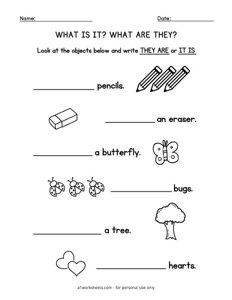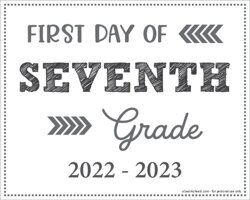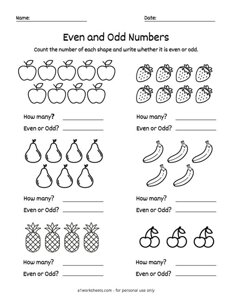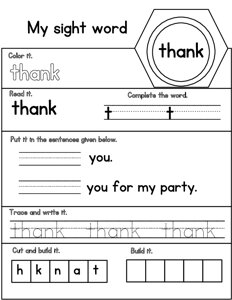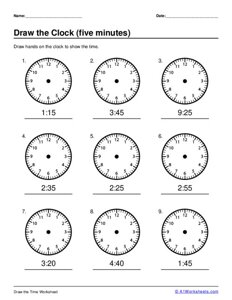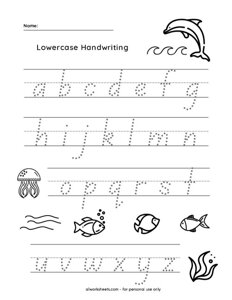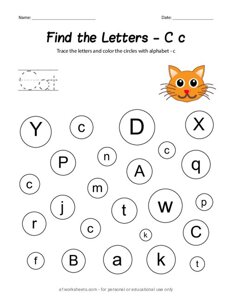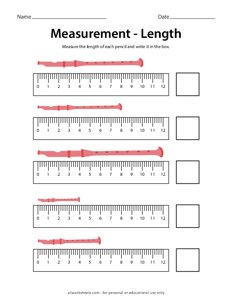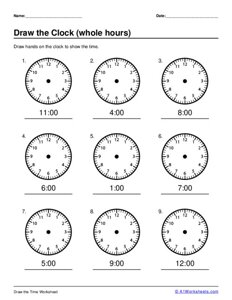Kindergarten and Preschool Vocabulary Worksheets
Free printable kindergarten and preschool vocabulary worksheets are perfect educational resources for teachers and homeschooling parents. Help introduce and enhance your child's essential reading, writing and learning skills.
Help your students practice their vocabulary skills with these free vocabulary worksheets. These can be printed and used at home or in the classroom. They are a great way to help kids learn new words and improve their reading and writing skills. Download a few today and see how your child improves!
Select a section to filter results:
No Results found! show all
You may also like (random picks):
What are They What is It Worksheet #4
What are They What is It Worksheets for first grade students where they read the sentences and answer as THEY ARE or IT IS. Such plural noun activities help kids with one or more than one objects.
plural, noun
First Day of 7th Grade Sign (Editable)
FREE Printable Editable First Day of 7th Grade Sign is perfect to make first day of School in Seventh Grade memorable. These editable printable signs are easy to download, edit, save, print and put together.
7, seventh, back, 1st
Fruit Odd or Even Numbers
How many Fruits Worksheets with Odd or Even numbers Printable for Grade One. Count the number of objects in each box and write if the number is even or odd.
count, counting, addition, math
Grade 2: Sight Word Worksheet #1
Grade 2 - Sight Word Worksheet #1 - Thank. For kindergarten and preschool students. Simply download and print.
writing
Draw the Clock - Five Minutes #3
Draw the Clock: 5 minute intervals
Free printable draw the hands on the clock to show time worksheets for Grade 1 for telling time from an analog clock. All the times are on five minutes like 10:55, 1:15 etc. Download and print.
analog, telling, time
Fish Themed Lowercase Letter Tracing
Printable Fish Themed Lowercase Letter Tracing Worksheet to help your kindergarten and preschool students practice lowercase alphabet writing skills.
letter, write, trace, alphabet, fish, ocean, print, a, b, c, d, e, f, g, h, i, j, k, l, m, n, o, p, q, r, s, t, u, v, w, x, y, z, coloring, lower, alphabets
Find the Letter C c
Free printable letter find activity pages for kids to learn tracing and identify uppercase and lowercase alphabet letters. The students can use colored pencils or crayons to fill the circles.
letters, alphabet, recognition, activity, finding, cat, color letter
Measurement - Flute Length
Measurement the Length of each object.
measure
Draw the Clock - Whole Hours #2
Free printable draw the hands on the clock to show time worksheets for Grade 1 for telling time from an analog clock. All the times are on the hour like 4:00, 9:00 etc. Download and print.
analog
What is vocabulary?
Vocabulary is the collection of words that a person knows. It is usually divided into two types: receptive vocabulary (words that a person can understand but maybe not use) and productive vocabulary (words that a person can use but maybe not understand). A person's vocabulary grows as they learn more words.
How can I help my child build their vocabulary?
Vocabulary is important because it is necessary for communication. The bigger a person's vocabulary is, the better they will be able to communicate with others. A strong vocabulary also helps people understand what they read and hear. It can also make writing and speaking more interesting.
There are many ways you can help your child build their vocabulary. Here are a few ideas:
- Read aloud to them every day. This exposes them to new words and helps them learn how to use them.
- Encourage them to talk about new words they learn. Ask them what the word means, how it is pronounced, and how it can be used.
- Play word games with them. Games like Scrabble, Boggle, and Word Ladder are great for helping kids learn new words.
- Have them do vocabulary worksheets. These are a great way to help kids practice using new words in a variety of different ways.

